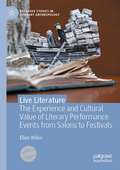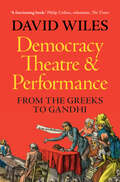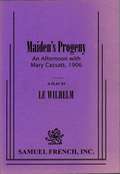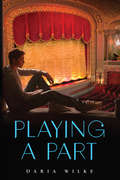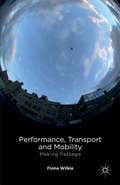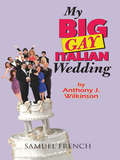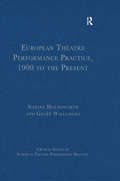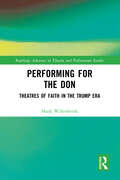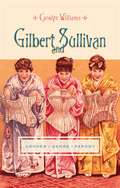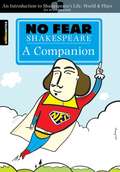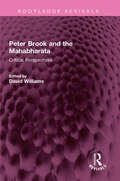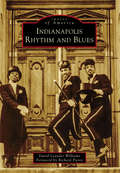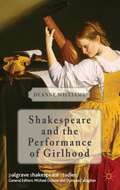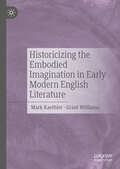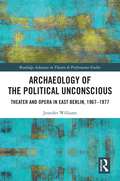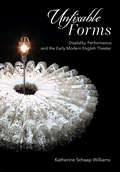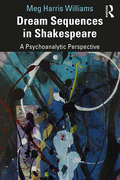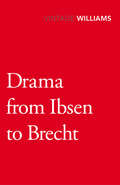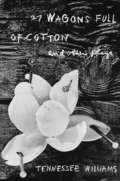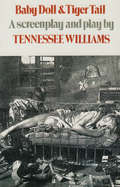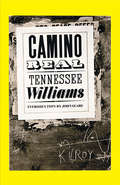- Table View
- List View
The Cambridge Companion to Theatre History
by David Wiles Christine DymkowskiScholars, amateur historians and actors have shaped theatre history in different ways at different times and in different places. This Companion offers students and general readers a series of accessible and engaging essays on the key aspects of studying and writing theatre history. The diverse international team of contributors investigates how theatre history has been constructed, showing how historical facts are tied to political and artistic agendas and explaining why history matters to us. Beginning with an introduction to the central narrative that traditionally informs our understanding of what theatre is, the book then turns to alternative points of view - from other parts of the world and from the perspective of performers in fields such as music-theatre and circus. It concludes by looking at how history is written in the 'democratic' age of the Internet and offers a new perspective on theatre history in our globalised world.
Live Literature: The Experience and Cultural Value of Literary Performance Events from Salons to Festivals (Palgrave Studies in Literary Anthropology)
by Ellen WilesThis ground-breaking book explores the phenomenal growth of live literature in the digitalizing 21st century. Wiles asks why literary events appeal and matter to people, and how they can transform the ways in which fiction is received and valued. Readers are immersed in the experience of two contrasting events: a major literary festival and an intimate LGBTQ+ salon. Evocative scenes and observations are interwoven with sharp critical analysis and entertaining conversations with well-known author-performers, reader-audiences, producers, critics, and booksellers. Wiles’s experiential literary ethnography represents an innovative and vital contribution, not just to literary research, but to research into the value of cultural experience across art forms. This book probes intersections between readers and audiences, writers and performers, texts and events, bodies and memories, and curation and reception. It addresses key literary debates from cultural appropriation to diversity in publishing, the effects of social media, and the quest for authenticity. It will engage a broad audience, from academics and producers to writers and audiences.
Democracy, Theatre and Performance: From the Greeks to Gandhi
by null David WilesDemocracy, argues David Wiles, is actually a form of theatre. In making his case, the author deftly investigates orators at the foundational moments of ancient and modern democracy, demonstrating how their performative skills were used to try to create a better world. People often complain about demagogues, or wish that politicians might be more sincere. But to do good, politicians (paradoxically) must be hypocrites - or actors. Moving from Athens to Indian independence via three great revolutions – in Puritan England, republican France and liberal America – the book opens up larger questions about the nature of democracy. When in the classical past Plato condemned rhetoric, the only alternative he could offer was authoritarianism. Wiles' bold historical study has profound implications for our present: calls for personal authenticity, he suggests, are not an effective way to counter the rise of populism.
Maiden's Progeny
by Le WilhelmFull length, drama / 1m, 2f / Interior / Frederick M Winship (UPI) writes regarding MAIDEN's PROGENY, "It was high time that someone wrote a play about Mary Cassatt, the only American member of the original Impressionist coterie of artists. Le Wilhelm, has met the challenge with flying colors with MAIDEN's PROGENY." This intellectually entertaining drama takes the audience to Cassatt's chateau outside Paris on a spring afternoon when Wynford Johnston comes calling uninvited. What follows is living discussion, of two very head strong individuals, that ultimately results in an understanding and growth in both characters. Never falling into the category of a lecture, this play provides insight and understanding of the art and times at the dawning of the 20th century.
Playing a Part
by Daria Wilke Marian SchwartzThe first young adult novel translated from Russian, a brave coming-out, coming-of-age story.In June 2013, the Russian government passed laws prohibiting "gay propaganda," threatening jail time and fines to offenders. That same month, in spite of these harsh laws, a Russian publisher released PLAYING A PART, a young adult novel with openly gay characters. It was a brave, bold act, and now this groundbreaking story has been translated for American readers.In PLAYING A PART, Grisha adores everything about the Moscow puppet theater where his parents work, and spends as much time there as he can. But life outside the theater is not so wonderful. The boys in Grisha's class bully him mercilessly, and his own grandfather says hateful things about how he's not "masculine" enough. Life goes from bad to worse when Grisha learns that Sam, his favorite actor and mentor, is moving: He's leaving the country to escape the extreme homophobia he faces in Russia. How Grisha overcomes these trials and writes himself a new role in his own story is heartfelt, courageous, and hopeful.
Performance, Transport and Mobility: Making Passage
by F. WilkiePerformance, Transport and Mobility is an investigation into how performance moves, how it engages with ideas about movement, and how it potentially shapes our experiences of movement. Using a critical framework drawn from the 'mobility turn' in the social sciences, it analyses a range of performances that explore what it means to be in transit.
My Big Gay Italian Wedding
by Anthony WilkinsonComedy / Characters: 10 male, 6 female / Andrew and Anthony are getting married - and everyone wants to "help"! My Big Gay Italian Wedding spins into a hysterical fiasco as everyone tries to have their way. From a saboteur ex-boyfriend to a loud, opinionated, outspoken Italian mother, personalities and culture collide in a music and dance-filled extravaganza. / "Feel-good hysterical comedy!" -The Wall Street
European Theatre Performance Practice, 1900 to the Present (Critical Essays on European Theatre Performance Practice)
by Geoff WillcocksThis volume captures the rich diversity of European performance practice evident in the twentieth and early part of the twenty-first century. Written by leading directors, actors, dancers, scenographers and academics from across Europe, the collection spans a broad range of subject areas including dance, theatre, live art, multimedia performance and street protest. The essays are divided into three sections on: performers and performing; staging performance; representation and reception, and document innovations in acting, performance and stagecraft by key practitioners. Articles also explore the ways that performance has been used to stage debates around major preoccupations of the age such as war, the human condition, globalization, the impact of new technologies and identity politics. This volume, which features previously published performance manifestoes, articles, and book chapters on the most frequently discussed and debated topics in the field, is an indispensable reference work for both academics and students.
Performing for the Don: Theaters of Faith in the Trump Era (Routledge Advances in Theatre & Performance Studies)
by Hank WillenbrinkThis volume examines the intersection of political power and religion during the presidency of Donald Trump through an examination of performance. This study begins with an examination of white evangelical Christian support for Trump through readings of the 2018 film The Trump Prophecy, based on a book of the same name, and The Faith of Donald J. Trump, a "spiritual biography" of the former president by veteran Christian reporters David Brody and Scott Lamb. White evangelicals Christianized Trump during his run for office in 2016 and Trump’s ascension to the presidency broke down barriers between church and state in service of dominionistic Christian aims. This exploration then looks at the conservative Catholicism through an exploration of Heroes of the Fourth Turning, a finalist for the 2019 Pulitzer Prize for Drama by Will Arbery, and Rod Dreher’s The Benedict Option. While Trump’s connection to evangelicals is well documented, conservative Catholics like Attorney General Bill Barr and Supreme Court Justice Amy Coney Barrett took on pivotal roles during the Trump administration demonstrating the significance of conservative Catholicism to his presidency. The author finally examines the "cult" of Trump on the internet by interrogating the performance of spirituality in pro-Trump conspiracy theories like QAnon. This book will be of great interest not only to theatre and performance studies scholars but also scholars with interests in political and religious studies.
Pericles (The New Cambridge Shakespeare)
by William Shakespeare edited by Doreen DelVecchio Antony HammondOver the past two decades there has been a resurgence of theatrical interest in Shakespeare's Pericles, which has been rescued from comparative neglect and is now frequently performed. This development is charted in the introduction to this edition, which differs radically from any other currently available. Doreen DelVecchio and Antony Hammond reject the critical orthodoxies of a corrupt text and divided authorship. Instead they show the play to be a unified aesthetic experience. The result is a more enthusiatic view of Pericles than that of other editions.
The Winter's Tale (The New Cambridge Shakespeare)
by William Shakespeare edited by Susan Snyder Deborah T. Curren-AquinoThe Winter's Tale is one of Shakespeare's most varied, theatrically self-conscious, and emotionally wide-ranging plays. This 2007 edition provides a newly-edited text, a comprehensive introduction that takes into account current critical thinking, and a detailed commentary on the play's language designed to make it easily accessible to contemporary readers. Much of the play's copiousness inheres in its generic intermingling of tragedy, comedy, romance, pastoral, and the history play. In addition to dates and sources, the introduction attends to iterative patterns, the nature and cause of Leontes' jealousy, the staging and meaning of the bear episode, and the thematic and structural implications of the figure of Time. Special attention is paid to the ending and its tempered happiness. Performance history is integrated throughout the introduction and commentary. Textual analysis, four appendices - including the theatrical practice of doubling, and a select chronology of performance history - and a reading list complete the edition.
Gilbert and Sullivan: Gender, Genre, Parody (Gender and Culture Series)
by Carolyn WilliamsLong before the satirical comedy of The Daily Show and The Colbert Report, the comic operas of W. S. Gilbert and Arthur Sullivan were the hottest send-ups of the day's political and cultural obsessions. Gilbert and Sullivan's productions always rose to the level of social commentary, despite being impertinent, absurd, or inane. Some viewers may take them straight, but what looks like sexism or stereotype was actually a clever strategy of critique. Parody was a powerful weapon in the culture wars of late-nineteenth-century England, and with defiantly in-your-face sophistication, Gilbert and Sullivan proved that popular culture can be intellectually as well as politically challenging.Carolyn Williams underscores Gilbert and Sullivan's creative and acute understanding of cultural formations. Her unique perspective shows how anxiety drives the troubled mind in the Lord Chancellor's "Nightmare Song" in Iolanthe and is vividly realized in the sexual and economic phrasing of the song's patter lyrics. The modern body appears automated and performative in the "Junction Song" in Thespis, anticipating Charlie Chaplin's factory worker in Modern Times. Williams also illuminates the use of magic in The Sorcerer, the parody of nautical melodrama in H.M.S. Pinafore, the ridicule of Victorian aesthetic and idyllic poetry in Patience, the autoethnography of The Mikado, the role of gender in Trial by Jury, and the theme of illegitimacy in The Pirates of Penzance. With her provocative reinterpretation of these artists and their work, Williams recasts our understanding of creativity in the late nineteenth century.
Gilbert and Sullivan: Gender, Genre, Parody
by Carolyn WilliamsLong before the satirical comedy of The Daily Show and The Colbert Report, the comic operas of Gilbert and Sullivan were the hottest send-ups of the day's political and cultural obsessions. Gilbert and Sullivan's productions always rose to the level of social commentary, despite being impertinent, absurd, or inane. Some viewers may take them straight, but what looks like sexism or stereotype was actually a clever strategy of critique. Parody was a powerful weapon in the culture wars of late nineteenth-century England, and with defiantly in-your-face sophistication, Gilbert and Sullivan proved popular culture could be intellectually as well as politically challenging. Carolyn Williams underscores Gilbert and Sullivan's creative and acute understanding of cultural formations. Anxiety drives the troubled mind in the "nightmare" patter song of Iolanthe and is vividly realized in the sexual and economic phrasing of Lord Chancellor's lyrics. The modern body appears automated and performative in the "railway" song of Thespis, mirroring Charlie Chaplin's factory worker in the film, Modern Times. Williams also illuminates the use of magic in The Sorcerer, the parody of nautical melodrama in H.M.S. Pinafore, the ridicule of Victorian poetry in Patience, the autoethnography of The Mikado, the role of gender in Trial by Jury, and the theme of illegitimacy in The Pirates of Penzance.
No Fear Shakespeare: A Companion
by Daniel O. WilliamsLet's face it. Hearing people talk about Shakespeare can be pretty annoying. Particularly if you feel like you don't understand him. When people talk about which of Shakespeare's plays they like best, or what they thought of so-and-so's performance, they often treat Shakespeare like membership in some exclusive club. If you don't "get" him, if you don't go to see his plays, you're not truly educated or literate. You might be tempted to ask whether the millions of people who say they love Shakespeare actually know what they're talking about, or are they just sheep?No Fear Shakespeare: A Companion gives you the straight scoop on everything you really need to know about Shakespeare, including: What's so great about Shakespeare? How did Shakespeare get so smart? Five mysteries of Shakespeare's life - and why they matter Did someone else write Shakespeare's plays? Where did Shakespeare get his ideas? Shakespeare's world Shakespeare's theater Shakespeare's language The five greatest Shakespeare Characters.
Peter Brook and the Mahabharata: Critical Perspectives (Routledge Revivals)
by David WilliamsFirst published in 1991, Peter Brook and the Mahabharata is a collection of essays which contextualizes the production of Peter Brook’s The Mahabharata. Written by both scholars and collaborators on Brook’s production, these essays seek not only to discuss such issues as the politics of theatre interculturalism, but to describe the nature of the working process, and detail the technical problems engendered by touring a production of this size and complexity. Furnished with a new preface by the editor, the book continues to be crucial research work devoted to unravelling the mesmerising as well as the polarising enigma known as Peter Brook’s The Mahabharata. Thoroughly heterogenous and controversially irreverent, this book will be of interest to students of theatre, performance art, literature, South Asian studies and media studies.
Indianapolis Rhythm and Blues (Images of America)
by David Leander WilliamsIndiana Avenue was traditionally the host to some of America's premier, world-renown entertainment icons in various genres. Along this winding, brightly lit thoroughfare were nightclubs, lounges, supper clubs, taverns, juke joints, and holes-in-the-wall that celebrated the best of the best in entertainment that America had to offer, from the 1920s on into the 1970s. On the bandstand at Denver Ferguson's Sunset Terrace Ballroom, the elegantly attired crooner Nat King Cole, in a sparkling blue silk suit, delivered his signature song "Mona Lisa." Nearby, B.B. King sang his 1973 down-home blues classic "To Know You is to Love You." At Tuffy Mitchell's Pink Poodle nightclub, "Moms" Mabley made the audience roar with laughter during her sidesplitting comedy routine. Indiana Avenue truly was the place to be for the best in entertainment.
Shakespeare and the Performance of Girlhood
by Deanne WilliamsThis is the first scholarly study devoted to Shakespeare's girl characters and conceptions of girlhood. It charts the development of Shakespeare's treatment of the girl as a dramatic and literary figure, and explores the impact of Shakespeare's girl characters on the history of early modern girls as performers, patrons, and authors.
Historicizing the Embodied Imagination in Early Modern English Literature
by Grant Williams Mark KaethlerCommonly used as a rallying cry for general approaches to literary studies, the imagination has until recently been overwritten with romantic and modernist inflections that impede our understanding of literature’s intimate involvement in early modern cognition. To recover the pre-Cartesian imagination, this collection of essays takes a historicist approach by situating literary texts within the embodied and ensouled faculty system. Image-making and fantasizing were not autonomous activities but belonged to a greater cognitive ecosystem, which the volume’s four sections reflect: “The Visual Imagination,” “Sensory and Affective Imaginings,” “Artifice and the Mnemonic Imagination,” and “Higher Imaginings.” Together they accentuate the imagination’s interdependency and friction with other faculties. Ultimately, the volume’s attention to the embodied imagination gives scholars new perspectives on literary and image production in the writings of Spenser, Shakespeare, Donne, and their contemporaries.
Archaeology of the Political Unconscious: Theater and Opera in East Berlin, 1967–1977 (ISSN)
by Jennifer WilliamsThis book investigates the aesthetic and political dialectics of East Berlin to argue how its theater and opera stages incited artists to act out, fuel, and resist the troubled construction of political legitimacy.This volume investigates three case studies of how leading East Berlin stages excavated fragmentary materials from Weimar dramatist Bertolt Brecht’s oeuvre and repurposed them for their post‑fascist society: Uta Birnbaum’s 1967 Man Equals Man at the Berliner Ensemble, Joachim Herz’s 1977 Rise and Fall of the City of Mahagonny at the Komische Oper, and Heiner Muller’s own productions of his trailblazing plays. In each instance, reused theatrical artifacts dialectically expressed the contradictions inherent in East German political legitimacy, at once amplifying and critiquing it. Illuminated by original archival research and translations of letters and artistic ephemera published in English for the first time, and engaging with alternative East German feminist epistemologies, this book’s critical investigation of culture and political legitimacy in the shadow of Germany’s fascist past resonates beyond the Iron Curtain into the twenty‑first century. Its final chapter examines how performative artifacts influence the process of political legitimation in more recent history, ranging from Checkpoint Charlie tourism to the January 6, 2021 US insurrection.This study will be of great interest to students and scholars in theater and performance studies, art history, musicology, German studies, anthropology, and political science.
Unfixable Forms: Disability, Performance, and the Early Modern English Theater
by Katherine Schaap WilliamsUnfixable Forms explores how theatrical form remakes—and is in turn remade by—early modern disability. Figures described as "deformed," "lame," "crippled," "ugly," "sick," and "monstrous" crowd the stage in English drama of the sixteenth and seventeenth centuries. In each case, such a description distills cultural expectations about how a body should look and what a body should do—yet, crucially, demands the actor's embodied performance. In the early modern theater, concepts of disability collide with the deforming, vulnerable body of the actor. Reading dramatic texts alongside a diverse array of sources, ranging from physic manuals to philosophical essays to monster pamphlets, Katherine Schaap Williams excavates an archive of formal innovation to argue that disability is at the heart of the early modern theater's exploration of what it means to put the body of an actor on the stage. Offering new interpretations of canonical works by William Shakespeare, Ben Jonson, Thomas Dekker, Thomas Middleton, and William Rowley, and close readings of little-known plays such as The Fair Maid of the Exchange and A Larum For London, Williams demonstrates how disability cuts across foundational distinctions between nature and art, form and matter, and being and seeming. Situated at the intersections of early modern drama, disability studies, and performance theory, Unfixable Forms locates disability on the early modern stage as both a product of cultural constraints and a spark for performance's unsettling demands and electrifying eventfulness.
Dream Sequences in Shakespeare: A Psychoanalytic Perspective
by Meg Harris WilliamsThis book takes a new approach to Shakespeare’s plays, exploring them as dream-thought in the modern psychoanalytic sense of unconscious thinking. Through his commitment to poetic language, Shakespeare offers images and dramatic sequences that illustrate fundamental developmental conflicts, the solutions for which are not preconceived but evolve through the process of dramatisation. In this volume, Meg Harris Williams explores the fundamental distinction between the surface meanings of plot or argument and the deep grammar of dreamlife, applied not only to those plays known as ‘dream-plays’ but also to critical sequences throughout Shakespeare’s oeuvre. Through a post-Kleinian model based on the thinking of Bion, Meltzer, and Money-Kyrle, this book sheds new light on both Shakespeare’s own relation to the play and on the identificatory processes of the playwright, reader, or audience. Dream Sequences in Shakespeare is important reading for psychoanalysts, playwrights, and students.
Drama From Ibsen To Brecht
by Raymond WilliamsWith typical critical flair, Raymond Williams examines the development of the dramatic form from Henrik Ibsen to Bertolt Brecht. Taking an expansive view of drama from around the world, he offers the reader profound insights into the role of theatre in society and into the workings of dramatic language. This is seminal reading for theatre-goers and literature students alike.
27 Wagons Full of Cotton and Other Plays
by Tennessee WilliamsThe thirteen one-act plays collected in this volume include some of Tennessee Williams's finest and most powerful work. They are full of the perception of life as it is, and the passion for life as it ought to be, which have made The Glass Menagerie and A Streetcar Named Desire classics of the American theater. Only one of these plays (The Purification) is written in verse, but in all of them the approach to character is by way of poetic revelation. Whether Williams is writing of derelict roomers in a New Orleans boarding house (The Lady of Larkspur Lotion) or the memories of a venerable traveling salesman (The Last of My Solid Gold Watches) or of delinquent children (This Property is Condemned), his insight into human nature is that of the poet. He can compress the basic meaning of life--its pathos or its tragedy, its bravery or the quality of its love--into one small scene or a few moments of dialogue. Mr. Williams's views on the role of the little theater in American culture are contained in a stimulating essay, "Something wild...," which serves as an introduction to this collection.
Baby Doll & Tiger Tail: A screenplay and play by Tennessee Williams
by Tennessee WilliamsA taut, vivid drama of a voluptuous child-bridge who refuses to consummate her marriage to an older, down-on-his-luck cotton-gin owner. In 1956, Time magazine called Tennessee Williams' Baby Doll "just possibly the dirtiest American-made motion picture that has ever been legally exhibited." The taut, vivid drama of a voluptuous child-bridge, who refuses to consummate her marriage to an older, down-on-his-luck cotton-gin owner in Tiger Tail County, Mississippi until she is "ready," has gained in humor and pathos over the years as society has caught up with the author's savagely honest view of bigotry and lust in the rural South. But Tennessee Williams was first and foremost a writer for the stage, and this reissue of his original screenplay for the Elia Kazan movie of Baby Doll is now accompanied by the script of the full-length stage play, Tiger Tail, developed from that screenplay during the '70s. The text, which incorporates the author's final revisions, records the play as it was produced at the Hippodrome Theatre Workshop in Gainesville, Florida, in 1979.
Camino Real
by Tennessee WilliamsNow with a new introduction, the author's original Foreword and Afterword, the one-act play 10 Blocks on the Camino Real, plus an essay by noted Tennessee Williams scholar, Michael Paller. In this phantasmagorical play, the Camino Real is a dead end, a police state in a vaguely Latin American country, and an inescapable condition. Characters from history and literature--Don Quixote, Casanova, Camille, Lord Byron--inhabit a place where corruption and indifference have immobilized and nearly destroyed the human spirit. Then, into this netherworld, the archetypal Kilroy arrives--a sailor and all-American guy with "a heart as big as the head of baby." Celebrated American playwright John Guare has written an illuminative Introduction for this edition. Also included are Williams' original Foreword and Afterword to the play, the one-act play Ten Blocks on the Camino Real, plus an essay by noted Tennessee Williams scholar Michael Paller.

